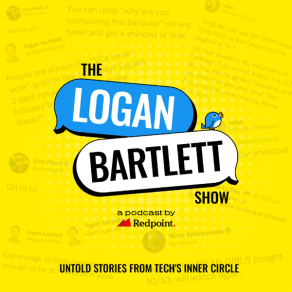
How do Stablecoins actually work | Crypto skeptic challenges viability
00:00:00 Mike Dudas: This one is gonna be a transition to sort of web three, which is, you know, maybe to your point, Bitcoin's not the answer and it's things like stable coins. Like it feels actually to me.
00:00:08 Zach Weinberg: Let's let's do any coin. Yeah. I don't, you know, to, you know, Dudas coin, Weinberg, coin, whatever the coin is. It almost is irrelevant to me in a sense.
Logan Bartlett: It sounds like real shit coins to me, by the way I, they sound terrible.
Zach: Well, the Weinberg coin, the Weinberg coin is the shittiest of the shit coins. And it doesn't work Friday to Saturday night either. Uh, but. No, like, so, so I, I live in Iran. I'm like middle to lower middle class, probably right. Where like I have to really work. Cuz if I'm in the upper middle class, I probably have tests to the regime. But so I'm in middle to lower middle class. First of all, I don't have any savings. Right. Because most of the people in these countries, part of the reason they suffer is because they have no money and they have no savings. So this is exclusively for like a subset of relatives or friends, whomever who are sending me money. Now here's the challenge for me. I. I tend to live kind of like paycheck to paycheck inside of this country. Right? That's part of why I need this money. The reason you see people in the United States send family members money is not so they can just hold it it's so they can use it because most of these folks actually need the money. They need to buy groceries. They need to pay a house. They have to pay for gasoline. They have to pay for pretty much all of their like daily activities. But now you're saying I'm gonna send you this money in this alternative Weinberg coin. But I can't actually move it into local Fiat or use it where I live because that transition doesn't, isn't possible for a variety of reasons, including the government being able to come in and just seize it.
Mike: So with stablecoin, it is becoming easier to do that though. And there, so walk me through that. So I get a, I get a stable coin payment from my friend in America. Yeah. It's 25 bucks and then yep. Dollar denomin five bucks stable coin. Yep. And then, okay. There's brokers in many of these local economies. And they will convert for not a super cheap fee. Right. But better than, you know, 70% depreciation in your, you know, monetary value over a year into dollars local policy. Yeah. And I just basically through a QR code or something, I send it to, I send it to their phone and they give me the local phone.
Zach: I get actual local currency.
Mike: You get local currency and it's not cheap today. It's not efficient, it's underground. And there are these underground markets. Um, it's not scaled. You just described Western union by the way. That is Western union. No, no, no. It's peer to peer Western unit doesn't require the center.
Zach: Centralized, centralized like Western union can't operate in these places. So the point is you have to accept, well, that's actually not true by the way, like Western union does operate in plenty of places through third party brokers, by the way, Western union has a market cap of $7 billion.
Mike: Totally. I know like, dude, the company I partnered with them at the companies I've worked at my, my point is that the markets move from Western union. You know, getting a SP a license and having, you know, specific pricing to an actual real market where there are people who can do this independently.
00:03:06 Zach: So I, but I, but I, I keep going back to this, like, how does it actually work? Right? Like I send it in a stable coin that I understand. And then there is a third party broker who has to then transfer it from stablecoin to local Fiat. Is that third party broker legal in that country?
Mike: Likely not.
Zach: Likely not. Okay. So we've now only enabled this use case through an illegal third party broker who can turn my stablecoin into local Fiat. Yeah. So bunch of ways to believe that cryptocurrency will succeed at scale, you have to believe that.
Mike: Things that are illegal in certain places are not immoral. And that some things that are illegal in certain places should and will, you know, exist. Like that's just a fact.
Zach: Yeah, no, I understand that. But at some point, what happens here from a user's perspective is I have this like illegal broker who sits between me and the stable coin because theoretically, this is the only way to me to get money into this country. And by the way, we've now limited the entire market. For this use case to like authoritarian regimes in third world countries, for people who do not have their own dollars, like this is -
Mike: For your example. I mean, you're through your, you know, eight questions that are diving deeper and deeper. You are limiting it to this specific thing. Which is one use case. Like it's not -
Zach: Yeah, where's the next one. Cuz now we're in, by the way, the worst part to me as -
Mike: The other is like I could, as a resident of Mexico, which also has inflation choose to use, you know, a, I invest in one of these like a neobank type service that allows me to immediately convert my paycheck. That's in pesos into USTC again, we had moved from Bitcoin to stable coin. Now we were on Bitcoin earlier. My point is that -
Zach: By the way, I can send money to, to someone in Mexico. Without any sort of Bitcoin middleman coin via Bitcoin talking about stable coin that I could send one more, any stable coin. So it doesn't fluctuate in value. I'm just assuming it doesn't fluctuate in value. If I wanna send money to somebody in Mexico today, I can do that through my bank, through PayPal, through Venmo. I can also do it through TransferWise.
00:05:14 Mike: You can't, you can't actually do it through all of those. And the fees are relatively high. And just because you can do so. Doesn't mean that you can do it better using new technology. I mean, it'd be like saying, Hey, just because I can call somebody on my landline phone, we shouldn't invent mobile phones. Like the point is technology does advance and improve. And I would argue that even if we haven't realized the full vision of all these technologies that evaluating them versus mature existing use cases and saying, because I can do something under condition X, Y, and Z. We shouldn't, you know, try and you're not, you're not saying this, but you're basically saying, because I can do something. The thing due to that you're describing, you know, isn't, shouldn't exist.










